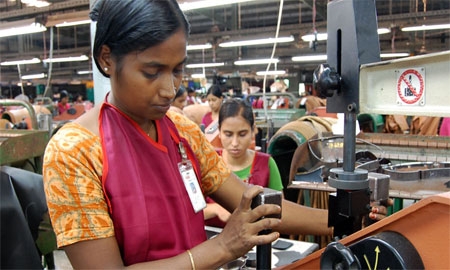The Bangladeshi leather industry developed during the 1970s and grew significantly in the 1990s. During that decade, the export market grew at an average rate of 10-15 per cent annually, averaging yearly exports that accounted for $225 million.
Apex Adelchi Footwear Limited (AAFL), formerly Apex Footwear Limited, is one of the major manufacturers and exporters of leather footwear of Bangladesh that went into commercial production in the nineties. Though the company has diverse interests, Mr Syed Manzur Elahi, Chairman of Apex Group, says: “Because our shoe business is our core strength, we will concentrate on that.”
Apex Adelchi first set up in Shafipur, once an economically depressed area where most of the population worked as farm hands, and transformed the region’s working landscape. Following Apex’s first factory opening, many of the smaller companies who made rubber soles, threads and insoles relocated to the area boosting the local economy, creating new employment opportunities and attracting workers from surrounding districts and towns.
Apex Adelchi is a prime example of how the leather industry has developed over the past two decades. In 1990 AAFL produced 1,000 pairs of shoes each day and employed 350 people. Today, its workforce is made up of more than 7,500 people distributed in two factories and its production capacity totals 15,000 pairs of shoes per day. Continuous training programs and generous salaries have helped the company to maintain a strong and loyal labour force.
"I HAVE BEEN IN THE BUSINESS SINCE 1973 AND I HAVE NEVER HAD A SINGLE STRIKE."
MR SYED MANZUR ELAHI,
Chairman of Apex Group
|
Mr Elahi says: “I have been in the business since 1973 and I have never had a single strike. Over the years, I have learned that to have a happy pool of workers, you need to make sure that Floor Management behaves properly when dealing with the workers. Our workers are to be given the respect they are due.”
Bangladesh’s leather is known all over the world for its quality. This is due partly to the luxurious vegetation the country boasts which encourages large populations of livestock. Traditionally, natural farms and fields do not apply barbed wire fencing which can damage the skins of animals. AAFL, for example, has experienced significant export growth as global buyers are relocating to Bangladesh from countries such as China and Vietnam. It is currently the leading exporter of leather footwear from Bangladesh to major shoe retailers in Europe, North America and Japan. In 2010, the company exported over 3.6 million pairs of shoes to 120 major shoe retailers and department stores in 30 countries, producing revenues of $100 million.
Fuelled by the growing international appetite for leather, the domestic tannery industry has rapidly expanded its production base. Apex Tannery, a sister concern of AAFL, is the largest in Bangladesh and with its independent effluent treatment plant (ETP) it safeguards the environment and the community it operates within.
Two per cent of the global livestock population is found in Bangladesh, providing Apex tannery with plentiful stocks of raw material. It can produce from both local and imported sources freely without import duties and, due to the country’s pro-export policy, AAFL is able source any required shoe component duty-free for re-exports.
AAFL’s achievements are not solely export-based; in 1997 it established its local retail wing and today it has the fastest growing shoe retail network in Bangladesh. Trading as Gallerie Apex within the domestic market, its product range of quality leather designs follows European trends and has received a phenomenal response from Bangladeshi consumers.
Apex is also known as one of the country’s most socially responsible firms. Compliant with industrial and environmental regulations it also works in areas of healthcare and education to ensure the future of the country.
Among some of the company’s Corporate Social Responsibility (CSR) initiatives, for which it has an annual budget allocated, are helping drug victims re-establish themselves in society through retraining and employment and contributing to flood affected victims in distressed areas.
As part of its plan to continue expansion within the leather sector, Apex became one of the major pioneers and stakeholders in the apprenticeship program for disaster-affected people organized by the Centre of Excellence for Leather skills Bangladesh Limited (COEL), and is providing technical support and lending its premises over the next three years to prepare 2,400 new trainees.
AAFL has set elevated objectives for the near future and aims to increase its export volume by 200 per cent and up its domestic sales 275 per cent by 2015. The stakes are high but the company is confident in its abilities to outshine global competitors.

0 COMMENTS